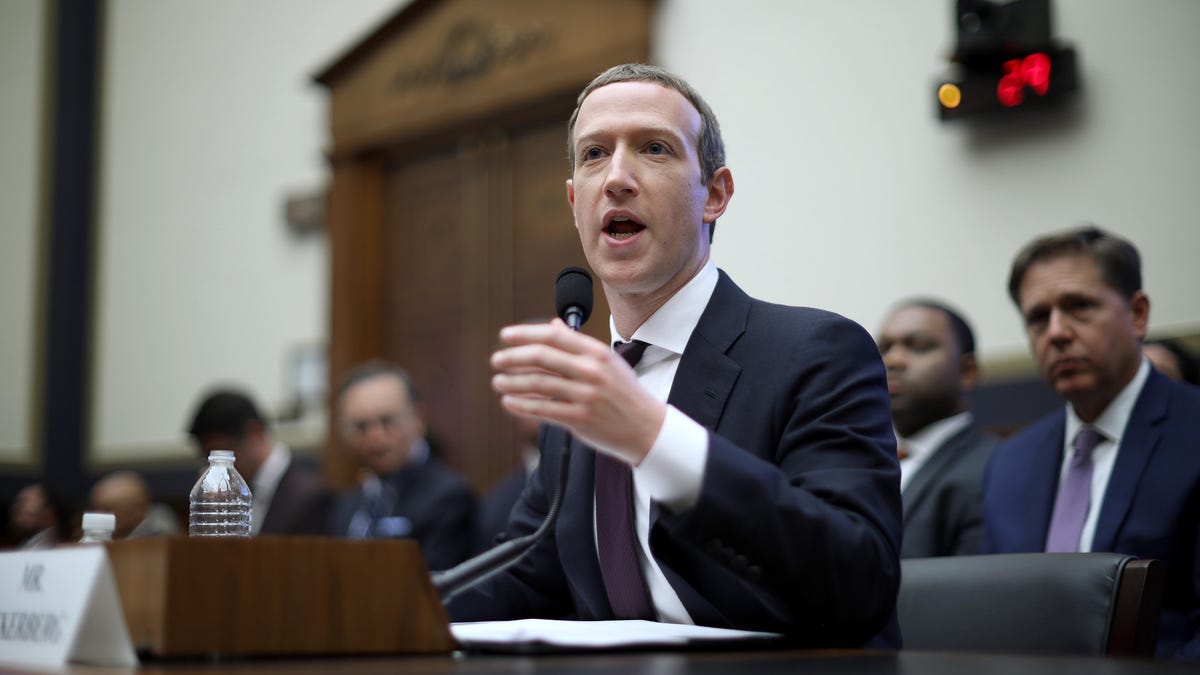Facebook's Zuckerberg gets grilled over political ad policy
Democrats continue to lash out at the CEO over Facebook's policy to let politicians lie.

Facebook CEO Mark Zuckerberg faces criticism from lawmakers as he testifies before the House Financial Services Committee.
Less than a week after his controversial speech on protecting the First Amendment, Facebook CEO and co-founder Mark Zuckerberg continued to take fire from lawmakers on Wednesday over the social network's decision to not fact-check advertisements from politicians.
House Financial Services Chairwoman Maxine Waters, a Democrat from California, grilled Zuckerberg during a hearing examining the company's plans to launch a digital payment system known as Libra. But lawmakers veered off into other areas as they questioned Zuckerberg, who was the sole witness testifying before the committee.
Referencing comments Zuckerberg made last week in a speech at Georgetown University, where he argued that allowing uncensored access to political speech was important for protecting the First Amendment of the Constitution, Waters criticized Facebook's policy to exempt political ads from third-party fact-checking, saying that the practice could discourage voting.
Waters said the practice "will be a massive voter suppression effort that will move at the speed of a click."
"Your claim to promote freedom of speech does not ring true," she continued.
In his testimony, Zuckerberg reiterated the company's position.
"The reason for [this policy] is that we believe that in a democracy, it is important that people can see for themselves what politicians are saying," Zuckerberg said. "Political speech is some of the most scrutinized speech already in the world."
Rep. Andy Barr, a Republican from Kentucky, defended Facebook and commended Zuckerberg for "standing for free expression" and resisting the temptation of "political correctness" in silencing voices on Facebook.
"I find it highly troubling that politicians are trying to bully you to be a fact-checker, and to be the speech police, especially in politics at the core of the First Amendment," Barr said. "I don't want you to be bullied by politicians who want to censor politically incorrect speech."
Zuckerberg's remarks in defending the practice highlight the fine line the company has been trying to walk in balancing free speech while combating misinformation during elections. The company has faced mounting pressure to do more to combat misinformation, hate speech and other offensive content on the world's largest social network, which has 2.5 billion users. The company also faces allegations from Republicans that it censors conservative speech. Facebook has repeatedly denied that charge.
Following the speech last week, Democrats and civil rights groups criticized Zuckerberg's comments, arguing that the company hasn't learned from its past mistakes. Specifically, they've taken issue with the policy, which resulted in the social media platform denying a request from Joe Biden's presidential campaign to pull down an ad from President Donald Trump's re-election campaign that contained misinformation about the former vice president.
In response, presidential candidate Sen. Elizabeth Warren, a Democrat from Massachusetts, ran an ad containing the deliberately false claim that Zuckerberg endorsed Trump. The ad, which noted it included misinformation, was an attempt to prove a point.
When asked by Barr during the hearing to pledge that Facebook wouldn't censor political ads from Trump, Zuckerberg reiterated his position on the First Amendment.
"My commitment on this is that we believe that people should be able to see for themselves what politicians are saying," he said. "That doesn't just go for Trump. That goes for any of the candidates for any of our national offices. People need to be able to see for themselves and be able to make judgments on what the candidates are saying, and their character."

